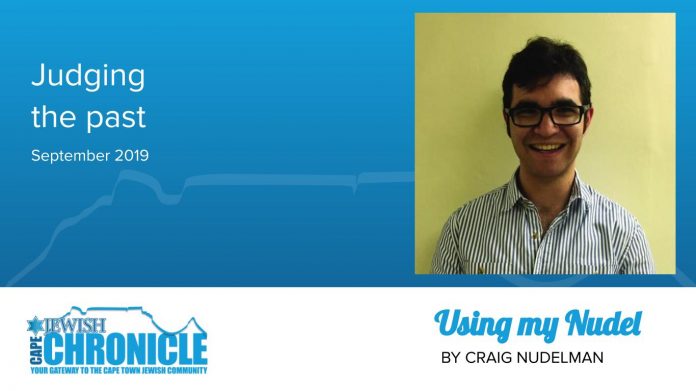In school, the Grade 7s are learning about the expansion of the Cape Colony by the British.
I don’t know if you know this, but the Frontier Wars (1779-1879) lasted 100 years, beginning with conflict in the Zuurveld, and spreading gradually all over the Eastern Cape. Many thousands of Xhosa died, along with Khoikhoi, Boer and, of course, British. The reason why I’m giving you a history lesson is because one of my students asked me, “Why couldn’t the British just keep their own land and be happy with that?”. I told her that we have to look at what they did through a historical lens and that at the time it seemed ‘right’ to them. But what is ‘right’ and can we say that what people did at any time was completely and utterly wrong?
Let’s try to look at the present. What can we see within society today, and how will our descendants judge us for what we are doing now? We can start with Trump, with his rhetoric of making America great again. His white supremacist, racist, homophobic, antisemitic and Islamophobic views rubbing off on Americans, who are in turn able to express their true feelings in a post-Obama, liberal America. His megalomania and egocentric behaviour can be seen in a nuclear arms race with Russia, trade wars with China and other crazy internal affairs. Will we see another four years with Trump in the Oval Office?
We can go across the pond and try to see how Boris Johnson will make Britain great again. How did people think Brexit was going to be a good idea? Did they think leaving the European Union (EU) would happen overnight? Did they not foresee the economic and socio-political issues it would create? It boggles the mind.
I have written about Israel in the past, but I’ve tried to stay away from this most controversial and emotional topic. The rise of right-wing, and ultra-orthodox political parties is to the detriment of everyone who wants a peaceful solution to the Israeli-Palestinian conflict, as is Netanyahu remaining in power. It is also extremely difficult to be Jewish in the Diaspora when Israeli politics is hampering the peace process. Can Israelis not see that Diaspora Jewry bear the brunt of political decisions that are made in Jerusalem? Being a Zionist in a country where there anti-Israel sentiment is high is a very difficult weight to bear.
But the left is being as destructive. Their messages are tinged with intolerance, even though tolerance is what they preach. You can’t do anything without it triggering some issue or another. Extremism on either side of the spectrum is bad; it leaves out the people in the middle (and I include myself among that group). We are not given a voice. Either we have become apathetic and have left the political conversation to those who are more vocal, or we are afraid of being judged.
I have also been judgmental. I have argued that my side of the story is right and those who I disagree with are wrong. This isn’t a constructive way to go forward. The ‘right’ way to do things is to look at another person’s point of view, acknowledge what they are saying and accept that there will be differences of opinion. Whether this is possible in political discussions around the world, G-d knows. Speaking of G-d, we are coming up to the High Holy Days, and the Yamim Nora’im, the Days of Awe. In the Unetane Tokef prayer, which we recite on Rosh Hashanah and Yom Kippur, we say, “on Rosh Hashanah it (their fate) is inscribed, and on Yom Kippur it is sealed”. I have always found these words interesting; in particular the way in which it is not your fate, but theirs’. I’ve been told that these days are meant to be reflective; that we are supposed to pray for our own sins and misgivings. However, here it speaks about ‘they’, or all of us. Who are ‘they’, and how are they judged by G-d?
By writing this column I have put myself out there to be scrutinised, whether for my political opinions, my hobbies, my career, or even for the way in which I use the English language to put forth my ideas. We need to be aware of that. We must acknowledge that, just as the pupil in my class judged the British for colonising and then expanding the Cape, we are all being questioned about our actions.
Albert Einstein said, “Whoever undertakes to set himself up as a judge of Truth and Knowledge is shipwrecked by the laughter of the gods.” We must ensure that we are mindful in our actions, and show care and compassion to all around us.
From all the Nudels, Shana Tova U’Metukah!
To read the full version of this month’s Chronicle in PDF, click here
To read the editor’s column for this issue, click here
To read the most read story of last month, click here











